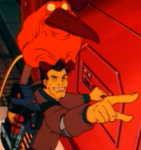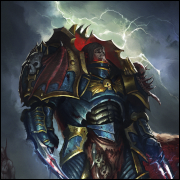|
K. Waste posted:I really think this 'escape' interpretation is spot on, and since you've covered the reading of its conclusion as kind of an optimistic, oppositional telling of the Old Testament, it should also be pointed out that the optimistic conclusion is consistent with the subversion of New Testament imagery. C. S. Lewis's whole thing was that it wasn't enough to believe Jesus was a good teacher; you had to believe he was the Son of God because otherwise his death was just another meaningless statistic and there really is no hope for mankind. Gilliam is a Christ figure in the film; he literally gives Curtis his own flesh in exchange for the child, a sacrifice for the other man's sin. But it is revealed that Gilliam cares more about life than he does about freedom. He believes so devoutly in the essential preservation of life that he ends up being exploited by Wilford. (Give to Caesar what belongs to Caesar.) But in an ironic twist, his ultimate death, the one from which there is no resurrection, severs Curtis's last tie to the world he knows. This allows him to follow in Gilliam's footsteps, losing his own arm and life in the process, but making way for the true liberation of man. I feel like Gilliam's death is an analogue to the death of Robespierre and the Thermidorean white terror. Robespierre was an aristocrat who had the good of the masses at heart, but when his revolution became too successful the reactionaries forced him to suicide. Curtis' choice at the end of the film as he stares into the engine is a Jacobinian question of what to do when the revolution has lost it's transformative power. Do you take the orb and scepter and rule over a nominally improved world like a Napoleon? Or, do you take the path of Gracchus Babeuf and The Conspiracy of The Equals even if it might mean death? Curtis sides with Babeuf. Considering the origin of the source material the allegorical mirroring of the French Revolution can't be spurious. The fight in the beginning when they rush the gates is a storming of the Bastille moment if ever there was one. Koivunen fucked around with this message at 01:44 on Jul 19, 2014 |
|
|
|

|
| # ? Jun 11, 2024 00:08 |
|
just a quick question, why the gently caress is every post just one big spoiler tag? Like why would anyone even click this thread and scroll through it to read anything? Pretty loving dumb.
|
|
|
|
Medoken posted:The movie ends with a dramatic change of perspective. Whereas Curtis had been our protagonist throughout the entirety of the film, in the aftermath of his decision to destroy the train we are no longer following his story anymore. I was left wondering why the film focused on Yona (Ah-sung Ko) and Tim as they left the train to set foot into the snow-pocalypse. I wasn't sure what to make of it, I had spent the last two hours rooting for Curtis to take apart the powers that be and institute a class-less paradise, and all of a sudden he was nowhere to be found. This change in protagonists (because certainly the movie begs us to wonder what will happen next to these previously tertiary characters) is the heart of this movie, and why I'm glad to know that it was released untouched. Koivunen posted:Gilliam's death is an analogue to the death of Robespierre and the Thermidorean white terror. Robespierre was an aristocrat who had the good of the masses at heart, but when his revolution became too successful the reactionaries forced him to suicide. Curtis' choice at the end of the film as he stares into the engine is a Jacobinian question of what to do when the revolution has lost it's transformative power. Do you take the orb and scepter and rule over a nominally improved world like a Napoleon? Or, do you take the path of Gracchus Babeuf and The Conspiracy of The Equals even if it might mean death? Curtis sides with Babeuf. Vermain posted:Yona and Timmy leaving the destroyed train is fairly clear Garden of Eden imagery. It's implicitly hopeful. Maluco Marinero posted:"You're the only person to have walked the length of the train" is that it represents a person who has lived/observed every part of the system at play, from the tailie poverty, to the middle class, to the decadence of the head. Wilfred believed that this would give Curtis perspective, that everything does need to have a place, order, that structural inequality is necessary for the survival of the system.
|
|
|
|
Black Baby Goku posted:just a quick question, why the gently caress is every post just one big spoiler tag? Like why would anyone even click this thread and scroll through it to read anything? Pretty loving dumb. Apologies - I'm never sure how much people want spoilered or not. I tend to err on the side of caution, especially when posting exclusively about the ending. v
|
|
|
|
General Battuta posted:it plays with the idea that maybe human extinction is the only hope for a better world That line of thought makes no sense to me, especially when presented in movies. Humanity Surviving Outcome is always better than Humanity Extinct Outcome.
|
|
|
|
MisterBibs posted:That line of thought makes no sense to me, especially when presented in movies. Humanity Surviving Outcome is always better than Humanity Extinct Outcome. Why? Clearly there are some situations in which death is preferable to a sustained existence of 'unnecessary' suffering. A good deal of medical and humanitarian ethics has to do with precisely this: Doing enough so that you help alleviate suffering, but not doing so much that you only end up perpetuating it. There's nothing to suggest even in fiction that survival is always the preferable outcome. In the case of revolution, to stage any kind of radical struggle against the system requires using one's own life as a 'betting chip,' for lack of a better term. Baudrillard theorized in The Spirit of Terrorism that radical Islamic extremism engulfed the popular imagination specifically because it's the most explicit expansion upon the basic premise of being willing to die for one's cause; in that suicide terrorists are not merely willing to die for a cause but, in fact, except their own corporeal destruction as integral to the collapse of global capitalism. At the same time, you don't need to be a suicidal, religious extremist in order to understand this. The radical militant already takes upon themselves the initiative to do what others are not prepared to do because they ultimately prefer freedom to survival, total disestablishment to compromise. Clearly, it is not wrong to accept death in the face of cruel, ignorant oppression. It is also clearly not wrong to fight against cruel, ignorant oppression. This leads me to conclude that it's at least possible for both to be true at the same time, that there can be an oppression so cruel and ignorant and total that the right moral option is to fight it without regard to survival. This is strict anti-objectivism, in which moral values actually precede the self. This is an oppositional reading of will to power and rational self-interest, in which the self is treated as metaphysical and a means to achieving something greater than what is initially conceivable. It's nothing short of the rejection of the impulse to 'go along' with the system and try to 'change it from within.' And it makes perfect sense. Who wants to be a liberal Nazi?
|
|
|
|
K. Waste posted:Why? Clearly there are some situations in which death is preferable to a sustained existence of 'unnecessary' suffering. I dunno if that's actually clear.
|
|
|
|
Uncle Boogeyman posted:I dunno if that's actually clear. Well, fair enough. Maybe 'clarity' doesn't necessarily enter into it, but I stand by the statement because I'm not the one claiming that there's literally no scenario (in fiction, no less) where humanity's sustained existence might, indeed, be worse than its extinction.
|
|
|
|
I hate to intrude on the great discussion going on here but I've got a more pedestrian question about the director. The opening scene in Snowpiercer where the planes are seeding the atmosphere is very visually similar to the scene in The Host where boats are dispersing an antimicrobial agent down a river. Is there a scene in an earlier film, not necessarily his own, that Bong Joon-Ho is referencing?
|
|
|
|
K. Waste posted:This is strict anti-objectivism, in which moral values actually precede the self. This is an oppositional reading of will to power and rational self-interest, in which the self is treated as metaphysical and a means to achieving something greater than what is initially conceivable. It's nothing short of the rejection of the impulse to 'go along' with the system and try to 'change it from within.' And it makes perfect sense. Who wants to be a liberal Nazi? I'm glad that this movie does have the ability to be read in multiple ways. I do think that for most people, philosophical justifications mean little if the end state is human extinction. That's a extreme leap of faith that ends up turning the public against the revolutionaries.
|
|
|
|
Busta Chimes.wav posted:I hate to intrude on the great discussion going on here but I've got a more pedestrian question about the director. The opening scene in Snowpiercer where the planes are seeding the atmosphere is very visually similar to the scene in The Host where boats are dispersing an antimicrobial agent down a river. Is there a scene in an earlier film, not necessarily his own, that Bong Joon-Ho is referencing? I apologise for my lower brow reference, but it's also really similar to the seeding of the atmosphere in the Animatrix short "The Second Renaissance"
|
|
|
|
Black Baby Goku posted:just a quick question, why the gently caress is every post just one big spoiler tag? Like why would anyone even click this thread and scroll through it to read anything? Pretty loving dumb. If you want a non-spoiler post: I watched this last night, I saw the trailer and thought it was worth a look for a Sunday night hungover movie session. It's highly entertaining but I can understand how some people were a little put off by the style and setting of the movie. I thoroughly enjoyed the entire thing, the violence didn't feel over the top and the movie moved at a fast enough pace to keep interest. The highlights though were the comedic bits and pieces that helped keep it light when it was becoming a little too dark. Cast, story, action sequences all quality. Best movie I've seen in a long while actually.
|
|
|
|
For anyone not familiar, a poster mentioned the "Christmas armistice", which was a truce between British and German soldiers on the front lines during World War I. They exchanged gifts, played sports, and generally enjoyed a nice and pleasant time together. Then they would go back to trying to kill each other. The New Year's scene was more believable than reality.
|
|
|
|
Reading the thread clears up a lot about this movie in terms of the train representing capitalism, etc, but there was one thing I didn't really get - Nam and the Head Security Guy kept coming back to life / regenerating. This, combined with the hand motions Wilford, Mason and Claude all made (the same as the kids in the machine) made me wonder if the whole thing had been going on a lot longer then 17 years, like some kind of dark city-eske experiment. Had they been in the same position at some stage in their own lives, or was it just there to represent that they are all 'part of the machine'?
|
|
|
|
Goffer posted:Reading the thread clears up a lot about this movie in terms of the train representing capitalism, etc, but there was one thing I didn't really get - Nam and the Head Security Guy kept coming back to life / regenerating. This, combined with the hand motions Wilford, Mason and Claude all made (the same as the kids in the machine) made me wonder if the whole thing had been going on a lot longer then 17 years, like some kind of dark city-eske experiment. Had they been in the same position at some stage in their own lives, or was it just there to represent that they are all 'part of the machine'? This might be a fair assessment. In fact, the only way they measure time is by how many times the train has gone a full lap around the tracks. There's no way to say if it has literally been 17 physical years.
|
|
|
|
They state in the classroom scene that the train makes a circuit of its track once every physical year. As for the hand motion, remember that they call the engine the Holy Engine. They literally worship it, and the hand motion is a symbol of the sacrifice humanity has to make to its god. It's the Train equivalent of the sign of the cross.
|
|
|
|
Busta Chimes.wav posted:They state in the classroom scene that the train makes a circuit of its track once every physical year. As for the hand motion, remember that they call the engine the Holy Engine. They literally worship it, and the hand motion is a symbol of the sacrifice humanity has to make to its god. It's the Train equivalent of the sign of the cross. Except the sign of the cross has been perverted by those whose only interest is to tear away at the flesh of Christ to preserve themselves. Like, the motion that they make is literally them reaching out and wrenching things away from the rear of the train. The motion is never made in the opposite direction.
|
|
|
|
Are you suggesting that religion hasn't been used to do that exact thing?
|
|
|
|
Tezcatlipoca posted:Are you suggesting that religion hasn't been used to do that exact thing? That's precisely the point. The perverted sign of the cross, rather than a remembrance and dedication to Christ's sacrifice, is used to demand that Christ sacrifice more.
|
|
|
|
Tezcatlipoca posted:Are you suggesting that religion hasn't been used to do that exact thing? Not at all. The film is a fairly standard metaphor for the apocalypse, and, as such, inevitably implicates religion within the systemic rise of anti-Christ. This is similar to Chaucer's apocalyptic plague stories in The Canterbury Tales - he is constantly sending up the exploitation of religious ignorance, even when religion is not explicitly a part of the story. "The Pardoner's Tale" in particular is noteworthy, in that Chaucer literally characterizes his young ryotoures ('rakes' or 'rebel rousers') as tearing "Christ's blessed body to pieces." (Line 380, A. Kent Hieatt and Constance Hieatt translation.) This is explicitly coded as a 'Black sacrament,' and oath to literally find and kill a man called Death: "Death shall be dead, if they can catch him." (Line 381) You'll notice that the inversion of the sacrament as an invocation of power over an enemy is rather explicitly allegorical for the belief of the youth that they can exploit religion and Christ's message to 'conquer Death.' (Here, Death is the seemingly apocalyptic memory of the Black Plague.) The point is that when the boys meet their embarrassing demise (literally vomiting and making GBS threads themselves to death), we are presented with a vivid rejection of religious ignorance that nonetheless, in a sense, reaffirms Christ's sacrifice specifically because it 'exposes' the complicity of the privileged in indulging 'Black Masses.' When Gilliam is executed, and Wilford extends to Curtis the offer to become the new Conductor, to be the 'Son of God,' he refuses. Allegorically, he has come to realization that Gilliam was being exploited by the revelers, the wine-drinkers, the whores (the men and the women), the propagandists, to pay lip service to the innateness of human dignity. This vacuum of human dignity can only be resolved by Curtis becoming a kind of 'new Christ,' but one who achieves an apocalyptic good, of finally and ultimately terminating suffering. What has happened is that Joon-ho has reversed the sequence of Hieronymus Bosch's The Garden of Earthly Delights. We begin in perdition, and the characters who live in Hell effectively 'go back in time' and see the decadence and fraud and exploitation that put them there. The final sequence is the new Eden, except the imagery of Yona and Timmy strikes me less like Adam and Eve and more like Mary and Jesus. The Virgin Mother and her son who is the living embodiment of the oppressed and the despised. Think Alfonso Cuarón's Children of Men.
|
|
|
|
Vermain posted:That's precisely the point. The perverted sign of the cross, rather than a remembrance and dedication to Christ's sacrifice, is used to demand that Christ sacrifice more. I know that's the point. K. Waste starts his post with except, as if the movie's version is somehow different than what happens in reality.
|
|
|
|
Tezcatlipoca posted:I know that's the point. K. Waste starts his post with except, as if the movie's version is somehow different than what happens in reality. The reason I said 'except' is because I actually am trying to distinguish the Sign of the Cross from the Sign of the Claw. Busta Chimes.wav said that the signs were 'equivalents,' and I specified that it represents the opposite meaning. Because it does. The sign of the cross is an assumption of humility and suffering. The Sign of the Claw instead reaches out and takes away.
|
|
|
|
Das Volk posted:I came here hoping to see some explanation why something so droll and disjointed could have gotten so many reviews. I guess the answer is politics? My thoughts exactly. It seems obvious to me that, judged purely on cinematic merit, the film was at best mediocre and certainly no better the pseudo-clever action movies that TNT plays on Sunday afternoons. Perhaps the foreign style of the film is throwing some people off? Fans of movies like Snowpiercer seem to fixate on plot, especially parts of the plot that may be read as allegorical or otherwise "clever", to the exclusion of every other aspect of film (except maybe cinematography). Personally, I read a lot of sci-fi novels and short stories as a young teen because the plots had cool elements that were brutally obvious and easy to pick out (ethical dilemmas, etc). It was only later, after I had read a lot of canonical literature and learned to pick up on other aspects of literary quality, that I realized how shallow and one-dimensional many of those stories were. Thought experiments are fun, but if a movie or novel is nothing but a stylish thought experiment, then it's hard to make the case for it being a good movie. Compare, for example, Inception to Snowpiercer. They're both stylish speculative sci-fi, but Inception is a superior movie precisely because it goes beyond that. Cobb's personal struggles give Inception an emotional resonance that Snowpiercer lacks. Everyone is leaping to try to pick out interesting symbolism and ignoring more fundamental aesthetic qualities. buttcoin smuggler fucked around with this message at 09:28 on Jul 22, 2014 |
|
|
|
buttcoin smuggler posted:My thoughts exactly. It seems obvious to me that, judged purely on cinematic merit, the film was at best mediocre and certainly no better the pseudo-clever action movies that TNT plays on Sunday afternoons. Perhaps the foreign style of the film is throwing some people off? I oppose this type of assessment because it treats film making like a maths equation. Plot + personal struggles > Plot
|
|
|
|
buttcoin smuggler posted:My thoughts exactly. It seems obvious to me that, judged purely on cinematic merit, the film was at best mediocre and certainly no better the pseudo-clever action movies that TNT plays on Sunday afternoons. Perhaps the foreign style of the film is throwing some people off? Symbolism isn't plot and that's a really weird equivalence to draw. Cobb's "personal struggles" in Inception are part of the plot, but are also symbols that can be read in a variety of ways. I guess you're saying that the characters in Inception are deeper or more fully realized, but I'd say that's questionable. They're all very one note, as is typical for heist films.
|
|
|
|
I just liked this movie cause it's got some pretty nifty fight sequences on a train that's travelling through a frozen wasteland in the future. Plus I just like trains.
|
|
|
|
buttcoin smuggler posted:My thoughts exactly. It seems obvious to me that, judged purely on cinematic merit, the film was at best mediocre and certainly no better the pseudo-clever action movies that TNT plays on Sunday afternoons. Perhaps the foreign style of the film is throwing some people off?
|
|
|
|
So speaking of cinematic merit, that first-person perspective shot in the axe brawl was great. It not only makes audiences identify with the oppressors visually but mentally as well. Just as you're thinking hey, why is this dude just staring back at Tilda Swinton, she yells, "why are you looking at me?"
|
|
|
|
buttcoin smuggler posted:They're both stylish speculative sci-fi, but Inception is a superior movie precisely because it goes beyond that. Cobb's personal struggles give Inception an emotional resonance that Snowpiercer lacks. All I know is I felt a huge emotional rush when they finally got through those first doors in time. More than any one moment from Inception. Of course, Snowpiercer subverts any attachment you may feel to the rebels by the end (one leader was a baby eater, the other a collaborator with the enemy), but still.
|
|
|
|
DeimosRising posted:Symbolism isn't plot and that's a really weird equivalence to draw. Cobb's "personal struggles" in Inception are part of the plot, but are also symbols that can be read in a variety of ways. I guess you're saying that the characters in Inception are deeper or more fully realized, but I'd say that's questionable. They're all very one note, as is typical for heist films. Not all symbolism is plot, but there have been many posts here about the allegorical nature of the film, which is firmly embedded in its plot. And I don't think that all of the characters in Inception are deeper or more fully realized, merely that Cobb in particular is probably a better character than any of the ones in Snowpiercer. I don't have anything against schlocky actions movies, and in fact I enjoy the hell out of them, but this one seemed to take up the challenge of being somewhat serious (e.g. blatant political content) and didn't handle it very well. Lord Krangdar posted:All I know is I felt a huge emotional rush when they finally got through those first doors in time. More than any one moment from Inception. Ok, but the adrenaline rush you get from a snappy action sequence is much different from the emotional connection you might make to Cobb's angst. It's strange you choose to deploy that smilie at this point in the thread, considering the 1000-word posts about Marxist symbolism were a few pages ago. buttcoin smuggler fucked around with this message at 21:10 on Jul 22, 2014 |
|
|
|
buttcoin smuggler posted:Ok, but the adrenaline rush you get from a snappy action sequence is much different from the emotional connection you might make to Cobb's angst. My experience was simply qualitatively different than the former, though. I was emotionally invested, not awed by the spectacle.] A film doesn't have to be serious tonally to tackle serious themes.
|
|
|
|
Lord Krangdar posted:My experience was simply qualitatively different than the former, though. I was emotionally invested, not awed by the spectacle.] Sorry, I misunderstood. And I certainly don't think a movie has to be tonally serious to tackle serious themes. But I do think that a movie shouldn't be put on a pedestal just because it did attempt to tackle serious themes, and also that the choice to tackle such themes does not "compensate" (this is poor word choice, but I can't think of anything better) in this case for serious flaws in other aspects of Snowpiercer.
|
|
|
|
buttcoin smuggler posted:Sorry, I misunderstood. And I certainly don't think a movie has to be tonally serious to tackle serious themes. But I do think that a movie shouldn't be put on a pedestal just because it did attempt to tackle serious themes, and also that the choice to tackle such themes does not "compensate" (this is poor word choice, but I can't think of anything better) in this case for serious flaws in other aspects of Snowpiercer. You've said what you think other people think about the film, but you have yet to say what those serious flaws are. You just didn't feel an emotional resonance to what was going on?
|
|
|
|
Lord Krangdar posted:You've said what you think other people think about the film, but you have yet to say what those serious flaws are. You just didn't feel an emotional resonance to what was going on? I'll have to think a bit more about how I want to phrase my exact criticisms. I didn't feel any emotional connection to what was going on, in part because I thought it was completely silly, but that actually isn't one of my major complaints. I didn't feel much emotional connection to the characters in The Raid either, but I enjoyed that movie. Maybe a first attempt would be to say that it tried to exist in a weird place between silly action movie and serious social commentary, and I while don't have any objections in principle to that, I don't think it worked in this particular case. I want to emphasize the word 'silly' there, because, for example, I wouldn't lodge the same complaint against Elysium. Maybe a good example of this would Tilda Swinton's speech at the beginning, or the "...and babies taste the best" comment at the end. I couldn't take them seriously because they were so patently ridiculous. And not just ridiculous in the sense that the whole perpetual motion train setup is ridiculous -- that part is fine -- but ridiculous in a very clownlike way. But they also weren't funny. Both of those pieces of dialogue seemed, for lack of a better phrase, tone deaf to me. On the other hand, I thought the school scene was a highlight and nailed the right combination of humor and "serious" bits. buttcoin smuggler fucked around with this message at 21:42 on Jul 22, 2014 |
|
|
|
buttcoin smuggler posted:It's strange you choose to deploy that smilie at this point in the thread, considering the 1000-word posts about Marxist symbolism were a few pages ago. I don't disagree with a lot of your points about art in general, particularly the value of appreciating highbrow lit that's often seen as snobby and irrelevant, but your argument as quoted was basically 'this movie is not good, unlike that other good movie, which was objectively better as per these criteria I have determined but won't explain.' I've liked your posts since then even when I disagreed, though, and would enjoy hearing more about your analysis of the film!
|
|
|
|
buttcoin smuggler posted:I don't have anything against schlocky actions movies, and in fact I enjoy the hell out of them, but this one seemed to take up the challenge of being somewhat serious (e.g. blatant political content) and didn't handle it very well. The problem I see here is the same one that I see every time there's a discussion about whether a film's appeal comes down to its 'subtext' or its 'cinematic merit.' You're condescending to your own enjoyment of "schlocky action movies," and as a result your forcing an arbitrary dichotomy between 'schlock' and "serious" film. You clearly acknowledge that a film can have both qualities, but you've failed to elucidate what precisely makes Inception a serious film with cinematic merit, and what makes Snowpiercer schlock. This points this up as a post-hoc assumption and not a reading of either film. Clearly, there are schlocky, purely allegorical and contrived elements in Inception, just as Snowpiercer is 'attempting' to be serious. You need to be more specific about what you think either film does or does not do. If you'll forgive me for being forward, what you seem to be describing doesn't actually have to do with what makes something 'cinematic;' you're describing prestige. Nolan and Wally Pfister shot a big-budget, ensemble cast action film in a way that - because the plot is literally 'multilayered' - creates above all a persistence of clarity and tone. Despite whatever particular grounding Cobb's experience might give the audience, this grounding and pretense of 'seriousness' is accomplished in a cinematographic and editing approach that, even when the subject is an optical illusion or paradox, emphasizes a linear progression which is really quite conventional. Even by writing it into the basic framework of the story that everything is a labyrinthine construct, what makes these action sequences cinematic is that we can be one-step removed from the artifice, but that being reminded of the plasticity of the film doesn't reduce its allure and compulsion upon our desires. Inception is nothing if not a film about cinematic aesthetics as derived from the highly detailed, vibrant set-pieces of the big budget spy film. But this prestige doesn't have anything to do with cinematic merit. It's a conscious creative decision that works within the context of the film. I know you're not a professional critic, but deriding Snowpiercer as schlock but holding up Inception as great action cinema in contrast is really just bad criticism. You're reducing the discussion of an individual film to its 'objective worth' based on a criteria which is already highly predicated on a vague aesthetic preference rather than anything that happens within either film. Perhaps the test of Joon-ho's film and whether or not it is successfully 'cinematic' shouldn't be aspiration to the prestige of a work which is already assumed to be objectively superior. In fact, it would be really stupidly problematic and, dare I say it, anti-cinematic if a film about a caste revolt were to aspire to prestige and decadence. As much as you may prefer films that, I guess, fall more neatly into categories of 'schlock' and 'serious,' the cinematic strengths of Inception are really inappropriate to the subject of Joon-ho's film.
|
|
|
|
General Battuta posted:I don't disagree with a lot of your points about art in general, particularly the value of appreciating highbrow lit that's often seen as snobby and irrelevant, but your argument as quoted was basically 'this movie is not good, unlike that other good movie, which was objectively better as per these criteria I have determined but won't explain.' Sorry, I wrote that really late last night. It was meant to be more of a personal reflection of the form of, "I would have thought this movie ruled when I was 13, but now my tastes have changed a lot, and I didn't like it." I guess it's hard to avoid implying something like "...and if only you learned to appreciate real literature too, then you wouldn't have such lovely taste!" Which, obviously, is mean and judgmental and hence not something I endorse. However, I'm probably prepared to defend a weaker version of that, which is that if you bracket the symbolism, the other parts of the movie aren't that interesting. And also perhaps that the symbolism isn't good enough to counterbalance the rest.
|
|
|
|
Beyond symbolism or allegory, the gradual but quite noticeable swing in tone over the course of the movie that you disliked was exactly what I found interesting. And I think all that worked together, because the tone got more absurd as it became clearer that the whole situation was absurd, but especially that the rebellion was misguided, poorly planned, and doomed to failure from the start. In the end causing a corrupt system to fail spectacularly is all that the protagonist can accomplish. You still haven't really touched on the film's failure in reference to its "fundamental aesthetic qualities". The mix of tones just didn't work for you. Don't you see the issue with criticizing others for not touching on that aspect when you're not really able to either? Lord Krangdar fucked around with this message at 22:18 on Jul 22, 2014 |
|
|
|
Lord Krangdar posted:it became clearer that the whole situation was absurd, but especially that the rebellion was misguided, poorly planned, and doomed to failure from the start. In the end causing a corrupt system to fail spectacularly is all that the protagonist can accomplish. I like that about the movie. It doesn't entertain the prospect of it even being successful. It shows their confident proclamation of things being different once they take engine being completely at odds with the reality of the situation. The fact that the upper classes were feeding them all the information with which they planned their rebellion makes it even more pointed.
|
|
|
|

|
| # ? Jun 11, 2024 00:08 |
|
Maluco Marinero posted:I like that about the movie. It doesn't entertain the prospect of it even being successful. It shows their confident proclamation of things being different once they take engine being completely at odds with the reality of the situation. The fact that the upper classes were feeding them all the information with which they planned their rebellion makes it even more pointed. Yeah I agree, although I don't know if the movie even needed that last bit.
|
|
|






















